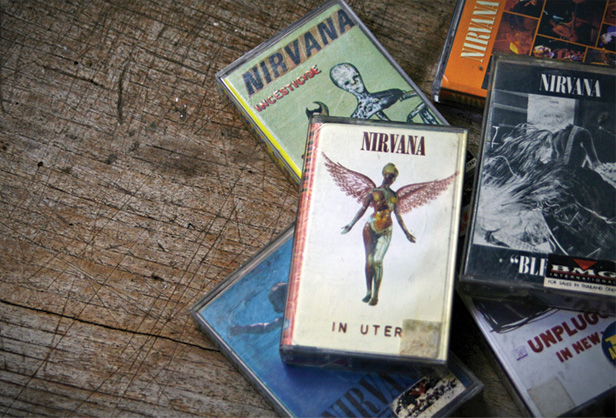News July 23, 2024
Nirvana, Marc Jacobs to Settle Lawsuit Over ‘Smiley Face’ Logo
The corporate entity representing the ‘90s rock icons had sued the fashion designer for trademark infringement.
Here we are now, litigate us.
A six-year-long legal dispute over Nirvana’s “smiley face” logo that involved the surviving members of the iconic ‘90s band, fashion designer Marc Jacobs, and an artist who claims he created the graphic appears headed for settlement.
In a July filing in the U.S. District Court for the Central District of California, the parties indicated that they agreed to a mediator’s proposal to settle the case.

No specifics were given, but the filing indicated that the parties would more fully document their agreement with a long-form settlement within 21 days. The filing was dated July 9.
“They presently are in the process of drafting and executing such agreements,” court documents indicated.
In 2018, the corporate entity that represents Nirvana sued Marc Jacobs International, asserting trademark infringement on the grounds that the smiley face logo the fashion brand was using in its “Bootleg Redux Grunge” clothing collection was virtually identical to a Nirvana logo.
Nirvana, one of the best-selling bands of all time, used a rough-drawn smiley face logo during its early 1990s heyday as a grunge/alternative rock pioneer. The smiley face had an uneven head, undulating mouth with a tongue sticking out and “X’s” for eyes.
The band claimed its late frontman, Kurt Cobain, drew the graphic, which for decades has appeared on band-branded merchandise from T-shirts and hoodies to posters.
The Marc Jacobs collection used a similar smiley face, though an “M” and “J” replaces the “X’s” as eyes. Lawyers for Nirvana alleged that the fashion house aped the logo, creating it in the same typeface and black and yellow colors.
The Nirvana camp also believed that Marc Jacobs made references in its marketing that intentionally sought to associate the “Bootleg Redux Grunge” collection with the band without legal permission.
For instance, one 2018 Marc Jacobs campaign allegedly said “This bootleg sure smells like teen spirit,” while a promotional photo showed Jacobs donning a smiley face T-shirt above the text “Come As You Are.” “Come As You Are” and “Smells Like Teen Spirit” were hit songs by Nirvana.
The legal battle intensified when Marc Jacobs International launched counterclaims that Cobain didn’t create the logo and that the band had failed to file proper copyright registration for it.
Things got more complicated when artist Robert Fisher became involved in 2020. Fisher claimed he had created the smiley face logo while he was art director at Geffen Records and working with Nirvana in 1991.
In 2023, a federal judge ruled that Geffen Records, rather than Fisher, would own the logo’s rights if Fisher had created it. Still, the judge, John Kronstadt, didn’t rule on who had created the image.
The Straits Times reported that an attorney who specializes in copyright law said that an entity or individual can’t hold a copyright for the idea of a smiley face. However, if that face has particular characteristics put together in a particular way, you can have a copyright on that.
“Marc Jacobs overplayed its hand in the designing phase, thinking that, ‘Oh, this is just a basic smiley face; this couldn’t be protectable by copyright,’” lawyer Daniel Lifschitz said. “That was dumb advice.”
Nirvana isn’t a stranger to trademark disputes.
Several years ago, Jocelyn Susan Bundy sued Nirvana, alleging the band used a drawing of hell created by her grandfather C.W. Scott-Giles, a British academic and noted writer on heraldry, on various articles of branded merchandise, including T-shirts. Ultimately, a U.S. appeals court ruled that the proper forum for the case to be heard would be in a court in the United Kingdom.
